For two decades, Jim Killen has served as the science fiction and fantasy book buyer for Barnes & Noble. Every month on Tor.com and the B&N Sci-Fi & Fantasy Blog, Jim shares his curated list of the month’s best science fiction & fantasy books.
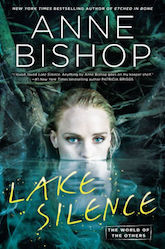 Lake Silence, by Anne Bishop
Lake Silence, by Anne Bishop
(March 6, Ace—Hardcover)
Anne Bishop returns to the universe of the Others in this standalone novel set in the town of Sproing in the Finger Lakes region. After a brutal divorce, Vicki DeVine takes possession of the Jumble, a compound of rotting buildings near Lake Silence she intends to turn into a resort. Vicki is a normal human, however, and completely unaware that in an area like this—where the shape-shifting Others are dominant—it’s their rules, that matter, and Vicki is unaware that her lodger Aggie Crowe is an Other. When a dead body turns up on the property, the police seem intent on pinning the murder on Vicki, who soon realizes the man was part of an effort led by her ex-husband to ruin her and take back the Jumble. While Vicki learns to navigate the dangers of living with the Others, her ex and his sketchy allies discover that crossing the Others is never a good idea. Bishop fans who lamented the “ending” of the series in Etched in Bone will be happy to learn the author hasn’t missed a single step.
 Burn Bright, by Patricia Briggs
Burn Bright, by Patricia Briggs
(March 6, Ace—Hardcover)
The fifth book in the Alpha and Omega series (spun off from the long-running Mercy Thompson saga) finds Charles Cornick and Anna Latham living as a mated werewolf pair, stepping into the role of pack leaders and watching over the Wildings, werewolves too dangerous to live with the pack formally, but existing on the fringes and still in need of protection. When a Wilding is kidnapped, Charles and Anna set off to the rescue, but there’s an unknown enemy circling the pack. As Charles and Anna seek to protect the Wildlings and discover the identity of their enemy, they will be tested like never before. Briggs crafts another addictive volume of urban fantasy sprung from Native American lore and legends.
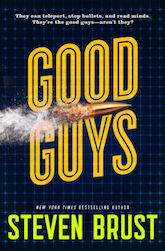 Good Guys, by Steven Brust
Good Guys, by Steven Brust
(March 6, Tor—Hardcover)
The Mod Squad meets magical bureaucracy! Magically-gifted Donovan, Marci, and Susan are all recruited by The Foundation, responsible for regulating and monitoring magic and the supernaturally gifted, and for keeping magic secret from the everyday human world. In return for minimum wage, the trio struggles with paperwork, expense reports, and all the other frustrations of a bureaucracy even as they set off to identify and stop an assassin using illegal magic to carry out their hits. As they dig into the mystery and get mired in red tape, they all begin to wonder—is the Foundation really the good guys in all of this? What’s the story behind the organization’s ancient enemies, The Mystici? What of the rumors of a mole operating from within? And what moral obligations do sorcerers have to us mundanes, anyway? Brust crafts another intriguing high-concept procedural that sits nicely alongside the Incrementalists novels.
 The Last Jedi: Expanded Edition, by Jason Fry
The Last Jedi: Expanded Edition, by Jason Fry
(March 6, Del Rey—Hardcover)
The novelization of the most recent entry in the stories franchise is more than your average page-to-screen affair. Writer Jason Fry worked with director Rian Johnson to deepen the story and incorporate scenes deleted from or not present in the theatrical film, to the point that the book is billed as an “expanded edition.” Yes, it’s going to tell the same story as the film—Rey’s training with Luke Skywalker, Finn heist-style adventure to help the desperate Resistance, and Kylo Ren’s continuing issues with hating everything and everyone—but it is more than just a the same flavors in a new package, offering greater insights into the events depicted in the film. That’s more than enough to make it a must-read for every Star Wars—and the exclusive Barnes & Noble edition also includes a 16-page photo insert you’ll find nowhere else.
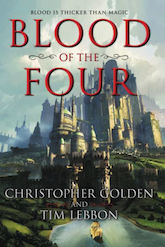 Blood of the Four, by Christopher Golden and Tim Lebbon
Blood of the Four, by Christopher Golden and Tim Lebbon
(March 6, Harper Voyager—Hardcover)
In Quandis, everyone is a slave to someone. The royals, living in comfort and luxury, are slaves to the gods, performing their duties as carefully as any servant. All others are slaves to the royals—or they are part of the Bajuman, a caste below even slaves able only be priests, or to be killed. This system works in part because the use of magic has been limited, and because everyone has been conditioned to know their proper place—but still, beautiful, ambitious Princess Phela chafes at the limitations around her. Even though she knows the dangers of magic, and knows there are others in line for the throne ahead of her, she embarks on an ambitious plan for her own advancement, threatening the balance of the entire world. To accomplished novelists team up for the engrossing start to a propulsive, accessible fantasy epic.
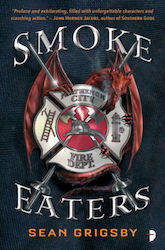 Smoke Eaters, by Sean Grigsby
Smoke Eaters, by Sean Grigsby
(March 6, Angry Robot—Paperback)
In the near future, the world finds itself suddenly invaded by dragons—actual fire-and-smoke breathing dragons. While the firefighters of the world become the first line of defense against the monsters, a small number of people immune to dragon smoke are drafted into the elite anti-dragon force known as the Smoke Eaters. Cole Brannigan was a firefighter for 20 years before the dragons came, and has been battling them ever since. On the verge of retirement, he suddenly discovers he’s able to withstand dragon smoke, and quickly becomes a rookie in the Smoke Eaters, the low man on the ladder, but tasked with a monumentally important new mission. When they stumble onto a conspiracy, Brannigan and his fellow Smoke Eaters have no choice but to protect their city and its people on their own, no matter the cost. In his debut, Grigsby more than delivers on a truly perfect premise—which is to say, this book is as fun as it sounds.
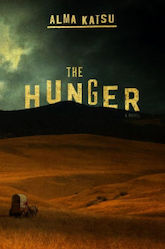 The Hunger, by Alma Katsu
The Hunger, by Alma Katsu
(March 6, G.P. Putnam’s Sons—Hardcover)
Katsu reimagines the horror of the Donner Party as a tale of supernatural terror and the genetic legacy of evil. In 1846, George Donner is leading his party of families westward when they discover letters left behind by previous travelers warning them to turn around or die. Everyone in the party is escaping something back east, and as they find mutilated bodies that appear to have been ritualistically sacrificed, they find not the wide-open spaces of the untouched wilderness, but walls closing in, crushing them. Eventually, a kind of insanity settles over them all, and they focus their hate—and sudden craving for human flesh, transmitted almost like a disease—on Donner’s wife Tamsen. This is a horrific alternate history that asks whether evil can be caught like a disease, or if it’s always there, in the blood.
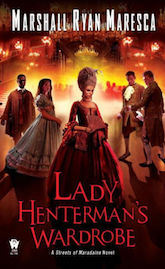 Lady Henterman’s Wardrobe, by Marshall Ryan Maresca
Lady Henterman’s Wardrobe, by Marshall Ryan Maresca
(March 6, DAW—Paperback)
The second Streets of Maradaine novel (and the seventh novel to take place in the fictional city of the same name) finds the neighborhood of North Seleth still reeling from the Holver Alley fire, a deliberate act of arson intended to drive the residents out. The Holver Alley crew, led by brothers Asti and Verci, have already brought street justice down upon the people who set the blaze, but the ones truly responsible have remained elusive. When clues point to the aristocrat Lord Henterman, Asti hatches a plot to infiltrate the noble household to find proof—but encounters his old lover-turned-betrayer Liora Rand already there, ensconced as Lady Henterman. As a rival gang and political developments complicate life for everyone in the neighborhood, the tense game of cat and mouse between Lord Henterman, Liora, and the Holver Alley crew leads Asti to the secrets contained in Lady Henterman’s wardrobe.
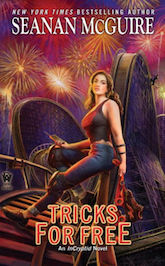 Tricks for Free, by Seanan McGuire
Tricks for Free, by Seanan McGuire
(March 6, DAW—Paperback)
Seanan McGuire jumps back into the tongue-in-cheek urban fantasy world of the InCryptid series. The seventh book picks up where the last left off, with Antimony Price on the run and on her own. As cryptozoologists, the Price family has dedicated themselves to protecting the hidden magical creatures of the world, and to keep everyone safe, Antimony must hide—and what better place to do so than Lowryland, the largest amusement park in Florida? There, she intends to lay low and make plans, but she finds herself surrounded by magic and magical creatures, and, soon enough, drawn into a mystery. Accidents begin to plague the park, and a corpse reveals Antimony’s presence to the folks who run Lowryland—a secret group of powerful magic users. They want Antimony and her powers for themselves, and she finds herself caught, desperate and alone. McGuire is famously an obsessive fan of theme parks, and her enthusiasm for the setting makes this the most entertaining installment of the series yet.
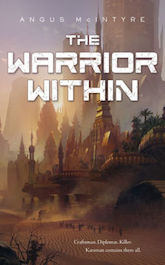 The Warrior Within, by Angus McIntyre
The Warrior Within, by Angus McIntyre
(March 6, Tor—Paperback)
Karsman is the de facto leader of a planet on the edges of civilization where the Muljaddy, a benign religious order, dominate everything, trading wages and food for simple devotion and prayer, and spurring a thriving economy dealing in the artifacts of a long-dead civilization. Karsman has risen to his position of authority in part due to the many personalities in his head, each with their own set of skills and experience, all of which fight daily for control of his body. When a group of mercenaries arrive hunting a mysterious woman, their failure to locate her leads them to slowly ratchet up their campaign of terror, until they’re challenging the Muljaddy itself—and Karsman begins to use the various skills his many personas possess to protect the planet and the people who live there. McIntyre’s debut offers an impressive, original twist on the classic superhero story, and a fascinating, hugely complex lead character—who’s really many characters in one.
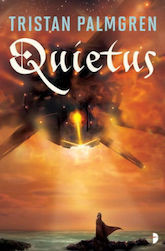 Quietus, by Tristan Palmgren
Quietus, by Tristan Palmgren
(March 6, Angry Robot—Paperback)
All you really need to know about Quietus is that one of the main characters is a transdimensional anthropologist—when’s the last time you read a book with one of those as the protagonist? Anthropologist Habidah’s universe is beset by a deadly plague. By way of study, she’s been assigned to research a similar calamity in our universe, and is dispatched to witness the Black Death as it swiftly decimates Florence. Moved by the tragic scene of a young Carthusian monk named Niccolucio, who watches as one after another of his brothers succumbs to the disease, Habidah breaks all the rules and saves him. This merciful act sets off a chain reaction that ultimately reveals there’s more to the plague in Habidah’s own universe than a simple illness, and her assignment to observe our world is not the task she believed it to be. There is a conspiracy at work, threatening to destroy a huge empire—and now, she and Niccolucio are part of it. The bells and whistles of sci-fi with the depth and worldbuilding of historical fiction make this another standout Angry Robot debut.
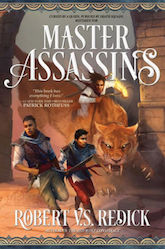 Master Assassins, by Robert V.S. Redick
Master Assassins, by Robert V.S. Redick
(March 6, Talos—Paperback)
The first book in Redick’s (The Charthand Voyages) new series The Fire Sacraments takes place on the war-torn and blood-soaked continent of Urrath. Squabbling brothers Kandri and Mektu have been drafted into the army of an insane prophet, and their daily survival depends on pretending to be true believers—a script Mektu, who thinks he sees demons, has trouble sticking to. When the brothers are blamed for an assassination—the prophet’s army believes them to be professional killers—they must flee into the desert known as “the Land that Eats Men” in order to survive. There, they meet an array of strange and deadly allies and enemies, and learn a secret that could change the course of Urrath’s history for better or much, much worse—if they can survive long enough to reveal it. Redick’s long-awaited return to fantasy is the start of a truly satisfying epic.
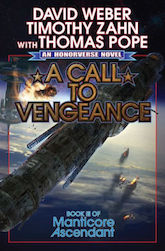 A Call to Vengeance, by David Weber, Timothy Zahn, and Thomas Pope
A Call to Vengeance, by David Weber, Timothy Zahn, and Thomas Pope
(March 6, Baen—Hardcover)
The third book in the Manticore Ascendant series finds the Star Kingdom in disarray after a series of devastating attacks by mercenaries sent by an unknown enemy across impossible distances. The Royal Manticoran Navy is in shambles, but even worse is the political danger they face, as an anti-Navy faction in the government gains power and influence, determined to destroy the kingdom’s only hope in the shortsighted pursuit of political gain. Officers Travis Long and Lisa Donnelly must gather every ally they can find—old and new, trustworthy and otherwise—in order to shore up defenses both internal and external before the next attack…provided they aren’t betrayed by their own government first.
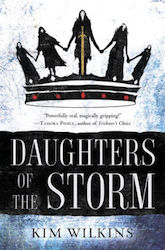 Daughters of the Storm, by Kim Wilkins
Daughters of the Storm, by Kim Wilkins
(March 6, Del Rey—Hardcover)
In this epic fantasy inspired by Norse myths, Aelthric, King of Thyrsland is hit with a magical curse that puts him into a coma. His five daughters work to keep the king’s ailment a secret to prevent their hated stepbrother from using it to his advantage in his quest for the throne. When they hear of a witch living far to the North who might be able to lift the curse, they set off to find her—but the five daughters have five distinct personalities that often come into conflict, even as their unique abilities serve as both their greatest strengths and biggest weaknesses. Warlike Bluebell, devout Willow, passionate Rose, flighty Ivy, and magically-gifted Ash must find common ground as they face dangerous obstacles in their efforts to save their father and preserve the kingdom—and time is quickly running out.
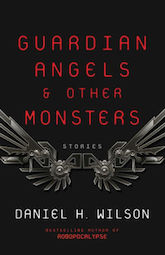 Guardian Angels and Other Monsters, by Daniel H. Wilson
Guardian Angels and Other Monsters, by Daniel H. Wilson
(March 6, Vintage—Paperback)
Wilson collects 14 stories linked by the general theme of artificial intelligence, including a few set in the universes of his bestselling novels Robopocalypse and Clockwork Dynasty. The stories are dark but oddly human: a young boy links the brain implant that fends off his seizures to a robot intelligence; a scientist finds a way to spend one last day with his young daughter; a robot designed to protect a child rises from the dead over and over again, determined to serve out its programming; a virtual avatar pines for his true love in a digital simulacrum. Lark Iron Cloud from Robopocalypse and Elena Petrova from Clockwork Dynasty make welcome appearances in other stories, and the result is an unusually cohesive collection that nevertheless offers plenty of variety.
Dayfall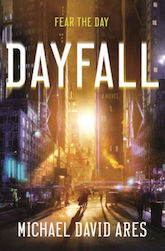 , by Michael David Ares
, by Michael David Ares
(March 13, Tor—Hardcover)
A sudden, swift war between Pakistan and India results in the northern hemisphere being trapped in an endless night, the sun shrouded by a nuclear winter. New Yorkers, naturally enough, quickly adapt—even as rising waters change the geography of the city—and a whole new way of living is established. In this new world, homicide detective Jon Phillips must keep working his beat. He is called into the mayor’s office and instructed to track down a serial killer within 24 hours—and informed that the end of the unnatural night is coming. The event is expected to spark incredible chaos, with riots and unrest throughout the city—and Jon must find the killer before the potential collapse of law and order. Arrayed against him are a virulent criminal underground, political gamesmanship, and the power-hungry leader of a private security company seeking to set himself as the enforcer for the entire city—not to mention the coming dawn. Ares imbues a solid procedural setup with a SFnal backdrop that stands apart.
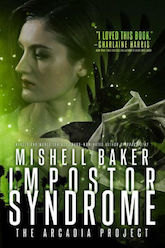 Impostor Syndrome, by Mishell Baker
Impostor Syndrome, by Mishell Baker
(March 13, Saga Press—Paperback)
As the third and (for now) final novel in the Nebula Award-nominated Arcadia Project series opens, the organization, which works as liaison between humanity and the realm of the fae, has collapsed in spectacular fashion. Its U.K. office head, Dame Belinda, has been denounced by the American side of the project for atrocities she’s committed—but Belinda isn’t going down without a fight. Millie Roper, our eyes on this hidden bureaucracy, sees her partner in Los Angeles framed for murder, part of an aggressive bid to stifle opposition. Though reeling from a setback in her mental health (she has borderline personality disorder), Millie is forced to step up and take the fight to Belinda. She concocts a risky heist in London that could neutralize the threat. It might also destroy the Project entirely, and put all of humanity at risk. Tasked with saving the world, Millie isn’t certain she can save herself, as everything hurtles towards a heartbreaking finale that pays off on all the storylines that Baker has built across three books.
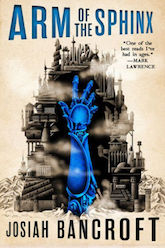 Arm of the Sphinx, by Josiah Bancroft
Arm of the Sphinx, by Josiah Bancroft
(March 13, Orbit—Paperback)
In the second installment of Josiah Bancroft’s Books of Babel, Thomas Senlin, now going by the name of Captain Tom Mudd and captaining the crew of an airship, finds himself in the peculiar situation of trying to break back into the Tower of Babel after putting so much effort into breaking out in February’s Senlin Ascends. Tom is still searching for his wife Marya, who vanished at the foot of the tower, in the meantime trying his hand at “gentlemanly piracy” in order to survive—and having very little luck at it. When his ship makes contact with the Sphinx, the genius inventor who oversees everything in the Tower, Thomas is given a seemingly straightforward quest that’s truly anything but—retrieve a particular book from a library. Anyone who knows anything about the Tower and its endlessly squabbling “ringdoms” knows nothing is ever as it first appears. The former schoolteacher-turned-failed pirate will go from the slave tunnels of the Tower and into ringdoms thought lost forever as this monumental word-of-mouth hit continues (book three, The Hod King, arrives in December).
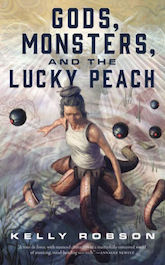 Gods, Monsters, and the Lucky Peach, by Kelly Robson
Gods, Monsters, and the Lucky Peach, by Kelly Robson
(March 13, Tor.com Publishing—Paperback)
In the 23rd century, the human population of Earth is just emerging from underground shelters as the planet recovers from an ecological disaster. Minh works with a team of scientists using advanced technology to restore the planet’s environmental balance—but then the development of working time travel technology robs her project of funding and interest, as everyone wonders why it’s worth bothering to fix the future when the past offers a perfect refuge. When Minh and her team have the chance to travel back to prehistoric Mesopotamia as part of a project to restore the ecosystem of the future, she must first secure funding and the support of the shadowy forces that control time travel itself—and that’s not even counting the dangerous prospect of actually exploring an ancient, hostile world. Robson has won accolades for her short fiction, and her debut novella is packed with enough invention to fill an entire novel or two (did we mention the disabled Minh’s body has been augmented with six mechanical, octopus-like robotic legs?), and a narrative style that will force you to sit up and pay attention.
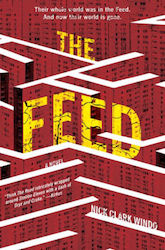 The Feed, by Nick Clark Windo
The Feed, by Nick Clark Windo
(March 13, William Morrow—Hardcover)
Windo imagines a semi-singularity wherein the Internet connects directly to our brains—a setup called the Feed—and engineers a disaster: a sudden global conflict causes the Feed to collapse, taking most everyone’s brains with it, and leading to the utter collapse of society. In a new world without civilization, one in which people’s very identities have been overwritten by the malfunctioning Feed, Tom and Kate are among the few survivors—people who had “gone slow,” purposefully disconnecting from the Feed before the end. All this means is that they’re the ones left scrabbling to establish a new community among those who remain, with only hardcopy books offering useful information—and everyone still has those brain implants, meaning Tom and Kate trade watches while they sleep, lest they be “taken over.” When their daughter Bea is kidnapped, the pair must leave the bare-bones security of their tent city to save her, sifting through a post-apocalyptic world of endless, grinding digital withdrawal. Some of the team behind AMC’s The Walking Dead are already planning to adapt this one for television, which tells you a little something about what you’re in for.
 Stone Mad, by Elizabeth Bear
Stone Mad, by Elizabeth Bear
(March 20, Tor.com Publishing—Paperback)
Karen Memery—horsebreaker, seamstress, and probable former prostitute—returns in a novella-length follow-up to 2015’s Karen Memory. We rejoin her taking in an evening’s entertainment in the alternate gold-rush Alaska with her steampunk mad scientist partner Priya. When the presence of spiritualists the Arcadia Sisters stirs up strange phenomena, Karen deduces that a tommyknocker, normally a denizen of Alaskan gold mines, is living in the basement of the hotel. Aligning with the Arcadias and stage magician Mrs. Micajah Horner, Karen rushed to stave off a disaster that could end with all the hotel’s guests dead—and manages to drive away Priya in the process, leaving her with a second emergency to deal with. Bear plans to return to Karen’s story in a few more novellas, and it’s great to spend time with these characters again.
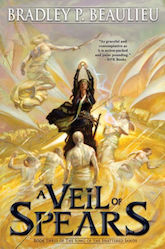 A Veil of Spears, by Bradley Beaulieu
A Veil of Spears, by Bradley Beaulieu
(March 20, DAW—Hardcover)
The third novel in the planned six-part Song of Shattered Sands saga opens in the wake of the Night of Endless Swords, a bloody battle that saw the Kings of Sharakhai barely emerge triumphant. Even as they seek to consolidate their victory over the Moonless Host, they’re falling into squabbling amongst themselves, each plotting to push the others aside and claim power for themselves. When our former pit-fighter hero Çeda locates the Moonless Host, she realizes just how slim their chances of survival are—especially when she learns that the King of Sloth is raising an army to march against the other nobles. She makes a desperate plan to free the asirim—powerful, deathless slaves of the Kings—even as the King of Swords arrives to track her down and bring her to justice. Beaulieu specializes in deep worldbuilding that serves to illuminate his fascinating characters, making this one of the most intriguing and satisfying fantasy epics running.
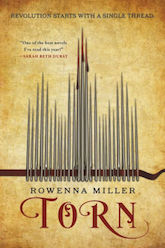 Torn, by Rowena Miller
Torn, by Rowena Miller
(March 20, Orbit—Paperback)
Bringing serious politics into fantasy literature is a prospect rife with danger, but in her debut, Miller more than pulls it off. Sophie is a dressmaker, one so talented that her ball gowns have attracted the attentions of the royal family. But it’s not just her skill with a needle that demands attention—she’s also able to stitch discrete magical charms into the garments: for love, for luck, for protection. Her rise in court brings her into contact with a handsome duke, and her fortunes seem assured—until her brother Kristos becomes involved with the rising proletariat revolution. When her brother is taken hostage by the resistance, Sophie is ordered to sew a curse into the Queen’s dress or watch her brother be executed. Hamilton-meets-stitchpunk magic? Yes, please.
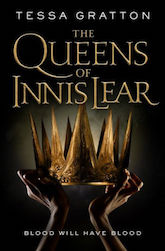 The Queens of Innis Lear, by Tessa Gratton
The Queens of Innis Lear, by Tessa Gratton
(March 27, Tor—Hardcover)
Inspired by King Lear, Tessa Gratton’s adult fantasy debut has earned comparisons to the work of Guy Gavriel Kay. It tells the story of Innis Lear, an island kingdom long protected by wild magic. But the king—obsessed with prophecies—has grown unreliable and erratic, and magic has nearly disappeared as a result. His three daughters encourage him to choose an heir, a strong monarch who can bring the magic back, but the king refuses to do so until a day specified by prophecy, leaving the island vulnerable to invasion in the meantime. The daughters, as different as can be, prepare for war—but how can they defend their home when their own house is divided and weak? Gratton’s editor Miriam Weinberg hasn’t stopped talking about this book on Twitter for months, and you’ll definitely want to see what all the hype is about.
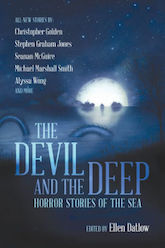 The Devil and the Deep, edited by Ellen Datlow
The Devil and the Deep, edited by Ellen Datlow
(March 20, Night Shade Books—Paperback)
Edited by Ellen Datlow, this collection of maritime-themed horror stories features tales from Alyssa Wong, Christopher Golden, Seanan McGuire, Stephen Graham Jones, and many others. A young woman finds her life affected by a friend’s death in ways she couldn’t have anticipated; a whaling ship is trapped in the icy arctic, its crew assailed by a force it doesn’t understand; a refugee in America becomes involved with the son of the King Under the Waves. These stories vary in tone and effect, but are linked by our shared primordial fear of the ocean depths—an environment deadly to us, despite being an essential to our survival. It is sure to delight horror fans of all sensibilities.
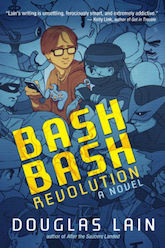 Bash Bash Revolution, by Douglas Lain
Bash Bash Revolution, by Douglas Lain
(March 27, Night Shade Books—Paperback)
If you’ve ever wondered why more zombie apocalypse stories don’t bother to detail the slow boil of civilization’s decline, this is the book for you. Matthew Munson is 17 and doesn’t do much with his time aside from compete in video game tournaments. He particularly favors an aging game called Bash Bash Revolution. When his father, Jeff—gone for the last decade as he worked on a mysterious, government-funded artificial intelligence called Bucky—suddenly returns, he insists that he and Matthew enter gaming tournaments together as a way to bond, but it quickly becomes obvious that Jeff’s skill at Bash Bash Revolution isn’t accidental, and is of greater import than he ever dreamed. Soon Jeff is asking for Matthew’s help in beating the game—which will give him insight to fixing Bucky, whose intelligence is unraveling, threatening to take society along with it. That this bleakly comic tale is told from a future in which Matthew observes “zombies” shambling about in VR goggles gives you an idea of just how dark this one is going to get.
This post was published simultaneously on the B&N Sci-Fi and Fantasy Blog.










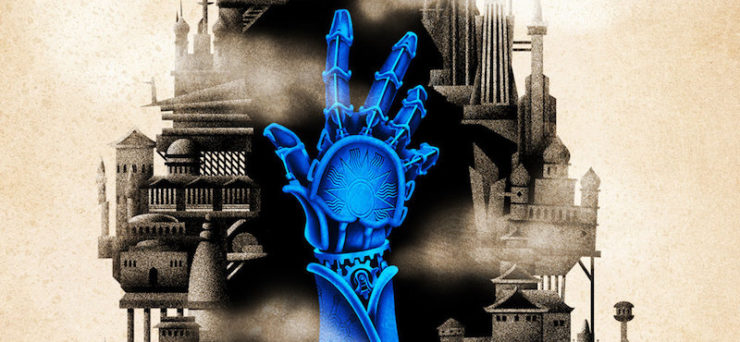
Josiah Bancroft’s “The Books of Babel” series is incredible. “Arm of the Sphinx” might even be better than “Senlin Ascends.” If your’e looking for something fresh and different, check these books out!
Blurb for Quietus intrigues me.
@1 I too loved Arm of the Sphinx even more than Semlin Ascends.
But start with Semlin Ascends. Short post on the first two books of Bancroft’s series here.